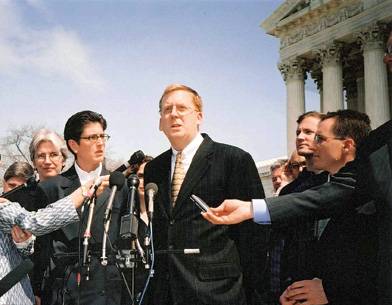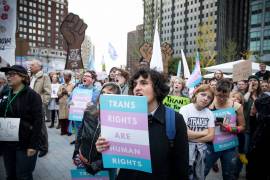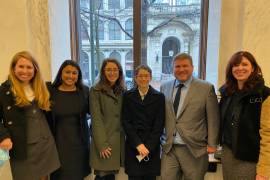
From Sex to Marriage: A Historic Day at the Supreme Court
Blog Search
In the blog series From Sex to Marriage: How We Got From Lawrence v. Texas to the Cases Against DOMA and Prop 8, we ask key players in Lambda Legal’s biggest victory to discuss the importance of the landmark case, and its impact on the marriage cases currently before the Supreme Court.
In this installment, Former Lambda Legal board member Paul M. Smith shares his experience arguing Lawrence before the Supreme Court. Smith is a partner at the law firm of Jenner & Block in Washington, DC. The National Law Journal named him one of the Decade's Most Influential Lawyers.
Lambda Legal: What stands out as the most emotional memory from the day you argued Lawrence?Paul M. Smith: Actually, it was the whole courtroom full of supporters that stands out. Nearly every person who had worked in previous years for LGBT equality was there to look the Court in the eye and say this is the day when you have to get rid of legalized discrimination against gay people. Almost no one seemed to be there supporting the State of Texas. This gave the whole experience a remarkable sense that I was speaking for a collective of people, all of whom were on the edge of their seats. There was also a sense that we were making history that day.
LL: Do you think the state-by-state strategy that led from Bowers v. Hardwick (in which the Court upheld sodomy laws) to Lawrence was a necessary one to get the result we sought?
Smith: Absolutely. The state-by-state strategy was important for two reasons. First, in reducing the number of states with sodomy laws down to 13 by 2003, it helped the people in the states where sodomy was no longer illegal. More significantly, it communicated to the Supreme Court, by the time of Lawrence, that criminalizing gay sexual intimacy was no longer acceptable to most Americans—that it was no longer the mainstream position. The Supreme Court does not like to get ahead of the American people on this kind of issue, but it knew by 2003 that it was behind the American people on the question whether the law should and could regulate adult, consensual, private sexual relations, gay or otherwise.
LL: When you argued 10 years ago in Lawrence that adults have a fundamental liberty to private, sexual expression without government intrusion, did you believe that this argument was a building block to future arguments about the freedom to marry?
Smith: Sure. The marriage issue was waiting there, just offstage. By that time, there had been marriage cases filed in Hawaii, Vermont and Massachusetts. Our main concern was that the marriage issue would be too much on the minds of the Justices—that it might deter them from overruling Bowers and holding that sodomy laws were unconstitutional. The connection is illustrated by much of what Justice Scalia ended up saying in dissent in Lawrence. As he pointed out, once the Court held that same-sex relationships are important and valuable, and that the law has no business interfering with those relationships based on one version of morality, the argument for a right to marriage equality was there to be made. Opponents of marriage equality have struggled, ever since Lawrence, to come up with any kind of plausible justification for discrimination against same-sex couples once morality was taken off the table.
Next: Lambda Legal’s Director of Constitutional Litigation, Susan Sommer, discusses the ways in which Lawrence opened the door to legal victories in the fight against “Don’t Ask, Don’t Tell” and marriage equality cases in state courts.
Previously:
- Lambda Legal Executive Director Kevin M. Cathcart introduces the series and the guest bloggers.
- Attorney Mitchell Katine recalls receiving the phone call that set the Lawrence case in motion.
- Ruth Harlow, former Legal Director for Lambda Legal, discusses our legal strategy on Lawrence.
- Roger Poindexter, Regional Director at Lambda Legal’s Dallas office, reflects on what it was like living in Texas before and after the historic decision.
- Hector Vargas, former Regional Director at Lambda Legal’s Atlanta office, discusses our community education strategy in the South regarding sodomy laws.





